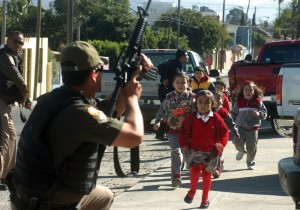 I write this on a Sunday, when people who spent the week shouting at busloads of refugee children sit in their churches, praising Jesus for his great mercies. The irony runs deeper: Those children gather because of a drug war we wage on their soil, which is supported by some of the same evangelicals loudly declaring we have no room for them.
I write this on a Sunday, when people who spent the week shouting at busloads of refugee children sit in their churches, praising Jesus for his great mercies. The irony runs deeper: Those children gather because of a drug war we wage on their soil, which is supported by some of the same evangelicals loudly declaring we have no room for them.
An estimated 60,000 Central American children will cross our southern border by the end of this year. There could be 120,000 next year, if something doesn’t change. So people are trying to change something, namely by stopping the buses. The buses bear hungry, needful children, some with diseases we’ve long ago stopped worrying about. “Return to Sender” is one of the more popular signs among protestors gathered to keep them out.
Why do they come? A key reason is the American-sponsored drug war, which has cost 80,000 lives in Mexico over the past eight years, and displaced an estimated 200,000. That violence has spread southward, into Guatemala, Honduras, and El Salvador. And it’s not just drug-runners killing one another. They kill anyone who becomes an obstacle. Children—sometimes as young as five-years-old—are drafted to serve drug gangs. Resistance invites severe retribution.
An anti-immigration activist with offices not far from my home claims these child refugees have been coached to lie about the bloodshed. “There’s no documentation of any mass slaughter,” he claims.
Tell that to people in El Naranjo, Guatemala, where drug runners decapitated twenty-seven farmworkers three years ago. Or U.N. investigators, who interviewed hundreds of Central American child refugees in recent years, and determined that nearly 60% are fleeing endemic violence, including not only torture and beheadings, but widespread rape. Human trafficking, unsurprisingly, is a burgeoning enterprise in this region as well.
This pervasive warfare has escalated as our government pours more weapons into the region. The Obama administration has given these tiny countries $2.5 billion since 2008 to militarize their anti-drug units. As a consequence, whereas a decade ago 80% of minor illegal immigrants flowing across the U.S. border were Mexican, now three-quarters come from the Central American countries we’ve armed.
The violence doesn’t come only from the hands of drug lords. As we are learning in the U.S., militarizing police forces yields indiscriminate, government-sanctioned violence. Two years ago in Honduras, for example, police in helicopter gunships mowed down eight innocents in the village of Ahuas, including a pregnant woman and a fourteen-year-old boy. The U.S. State Department claims that DEA agents, who had been “advising” Honduran police in the area, were absent from that night’s operation. Villagers report, however, that several of the masked raiders were “gringos” who spoke American English to one another.
We sponsor both sides of this war; we constitute the primary North American demand for illegal narcotics, and we supply the gunships, automatic weapons (sometimes to drug dealers themselves, lest anyone forget Obama’s Fast and Furious scandal), and tactical support. We arm both sides, and we turn our backs on the carnage.
Only now the carnage is at our doorstep. They come shell-shocked, disease-ridden, hungry. And sadly, self-professing Christians are some of their loudest detractors. Never mind that Americans have five churches for every immigrant child. Never mind that these same churches spend millions sending their privileged children on brief junkets we call “mission trips,” presumably to reach the very kinds of people who now huddle at our border, begging for help.
Officials with the evangelical American Family Association have long supported drug criminalization. They have also supported more stringent border policing. In a recent essay, AFA official Bryan Fischer assembled Bible snippets to argue for the sanctity of American borders. He recounted how Moses pleaded with the king of Edom to allow the Israelites to pass through his lands.
“The king of Edom,” he observed approvingly, “was utterly impervious to this plea for so much as a tourist visa.” And Moses, law-abiding prophet of God, accepted the king’s decision. “The lesson?” Fischer asked. “Each nation’s sovereignty is marked by its boundary, and each nation has the moral right to decide who will be given permission to enter its sovereign territory.”
Of course that’s no argument about the current crisis at all; we could change our regulations to allow these children to stay. But the illogic of Fischer’s argument aside, a danger in quoting the Bible to make your point is that you invite people to reply in kind. So let’s consider what else the Bible tells us about Edom:
“My sword in heaven is soaked with blood,” God says through Isaiah. “Behold, it shall come down on Edom, and with judgment on the people of destruction.”
“I shall stretch out My hand against Edom,” the Lord says through Ezekiel, “because they remembered wrongs and exacted punishment.”
And through Obadiah, the entirety of whose recorded prophecy is devoted to judgment for Edom’s rejection of Israel’s children, God says:
And you should not have looked on the day of your brother, on the day of foreigners, and you should not have rejoiced against the children of Judah in the day of their destruction…. You should not have stood at the parting of the ways to cut off his fugitives; you should not have delivered up his survivors in the day of distress.
Following in the footsteps of the merciless Edomites is ill-advised, it seems.
How then shall we respond to these children? I’m sure there are many political nuances to consider. But we who claim to be Christians should begin with this: mercy. We should remember a Christ who linked admission to heaven with love of foreigners in need: “I was a stranger and you took me in.”
We should remember, in other words, those silly bracelets so many of us sported just a few years back. WWJD: What would Jesus do?
But maybe that’s no longer in fashion.
Tony Woodlief lives outside Wichita, Kansas, and is the author of a spiritual memoir, Somewhere More Holy. His essays on faith and parenting have appeared in The Wall Street Journal, The London Times, and WORLD Magazine. His short stories, two of which have been nominated for Pushcart prizes, have been published in Image and Ruminate. His website iswww.tonywoodlief.com.















